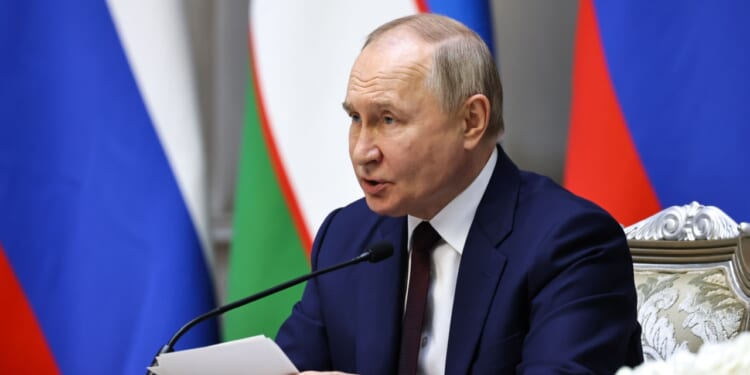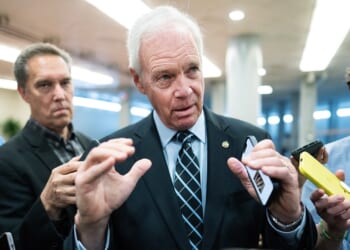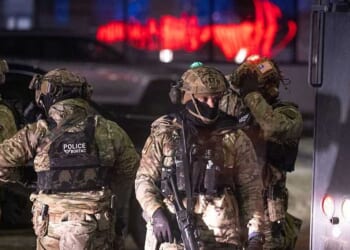Despite a long list of regional setbacks, Russia still maintains a sizable influence from Libya to Iran.
The official Kremlin website on the recent Russian-Arab Summit is a remarkable artifact. The site links to various news reports, offers helpful media contacts, and explains the origins of the event it was designed to mark. There’s even a little text on the summit’s logo, which plays on the shape of a falcon: “a symbol of strength, freedom, and nobility, which is significant in both Russian and Arab cultural traditions.”
There’s just one thing missing: any substance on the October 15 summit itself—because it never took place. What was planned as a grand celebration of Russia’s myriad ties to the Arab world ended with an ignominious whimper. Russian president Vladimir Putin was forced to cancel the event not long after Donald Trump arrived in the Middle East to celebrate his Gaza ceasefire plan. Given the choice, the glittering array of Arab leaders who had penciled in the Moscow event opted instead to hang with the US president in the Egyptian resort town of Sharm el-Sheikh.
A particularly humiliating moment came when Russian foreign minister Sergei Lavrov had to concede to the international press that his country hadn’t been invited. “Not everyone likes the partnership between Russia and the Arab world,” he noted. President Putin had to content himself with sloppy seconds in the form of Syrian president Ahmed al-Shara, who probably felt he could allow himself the trip to Moscow since he had already met with Trump in Riyadh in May.
As this farce would suggest, Russia’s relations with the Middle East have hit a new low. Israel’s campaign of revenge against its regional enemies following the Hamas terror attack on October 7 has also entailed serious collateral damage for Moscow. Hamas and Hezbollah both enjoyed a close relationship with the Russians; now they have been crushed. Former Syrian president Bashar al-Assad was given a new lease on life by Putin’s 2015 intervention in that country’s civil war—but the collapse of the Baathist regime last December, culminating in Assad’s flight to Moscow, amounted to a devastating setback to Russia’s fortunes in the region.
Israel’s lightning prosecution of the Twelve-Day War in Iran in June (with some American help) marked the culmination of this ominous trend. The Israeli strikes on Iran’s nuclear facilities were damaging enough on their own. Yet the Israelis also managed to wipe out much of the Iranian military leadership. The limits of Russian friendship became clear for all the world to see when Moscow proved unable to offer any sort of meaningful assistance to its friends in Tehran. Putin saw fit to declare that the Iranians hadn’t asked for direct military support, and also made a point of saying that the Iranians had declined to accept a Russian offer of advanced air defense systems.
Can Russia recover from this series of defeats? In many ways it already has. The Axis of Resistance lies in ruins, but Shara’s visit with Putin in Moscow—even if it didn’t quite compensate for all those Arab leader no-shows. Nonetheless, the meeting sent a telling message of Russian resilience. The former jihadist, who may well have experienced Russian attacks during the war, declared that he now aimed to “restore and redefine ties” with the Russians as the new Syria sets out to rebuild itself.
Putin evoked decades of “special relations” with the Syrians—a reference to a history that goes back to the Soviet era, when Syria was one of Moscow’s most important regional allies. Most importantly, Shara said that he would honor past deals with Moscow—a reference, presumably, to the Russian naval base at Tartus on the Mediterranean coast and its Hmeimim airbase in Assad’s home province of Latakia. That prompted at least one commentator to wonder whether Russia had ever really left Syria in the first place.
This should not come as a complete surprise. Syria, like many other countries in the region, is doing its best to cope with a volatile era. The United States and Israel like to cast themselves as quasi-hegemonic powers in the Middle East, but the temptation to overreach invariably has consequences. The Israeli airstrike on Qatar in September is likely to have consequences far beyond its failure to kill the Hamas officials who were its targets. It merely confirmed to the countries of the region that maintaining relatively businesslike relations with the Israelis won’t protect you against their wrath—and that you can never count on Washington’s capacity to rein them in.
Anna Borshchevskaya, a Senior Fellow at the Washington Institute, notes that the Gulf states emphasized their support for Russia in the wake of the strike: “This was a signal to Washington that the Gulf region perceives the US as unreliable and wants to have good relations with all major powers—and considers Russia as one. This is not because they want to break ties with the US but because they do not feel they can rely on the US alone.” Russia also plays a major role in OPEC+, she notes—a factor that isn’t going to go away anytime soon.
Suppose you’re Saudi Arabia or the United Arab Emirates (two countries with expanding middle power aspirations). In that case, you will want to hedge your bets to the greatest possible extent by expanding ties with China, for example, as both have been doing. Foreign policy diversification is a natural response to American and Israeli dominance. Russia’s ultra-pragmatic desire to seek deals with everyone, across all ideological borders, is affording it many opportunities to stealthily and not-so-stealthily rebuild its position.
Moscow is cultivating relations with the Gulf monarchies on a scale that would have been unimaginable a few years ago, successfully eroding its long-standing reputation as a regional troublemaker who favored heterodox partners like the Syrians and the Iranians.
Trump’s erratic style of foreign policy creates additional opportunities. No one in the region believes that his celebrated Gaza peace plan is going to work; genuine success would require just the sort of strategic vision and hard-nosed attention to detail that the president appears to hold in contempt. A different US administration might be burning the midnight oil to come up with plans for frustrating the Kremlin’s ambitions in places across the region; instead, State Department decision-making on the Middle East appears to be mired in internal feuding, while the slimmed-down NSC and the Pentagon have succumbed to passivity, waiting for orders from the Big Boss that don’t always seem to arrive.
Take Iraq. If there’s one country in the Middle East where Washington should be able to exert some leverage, it’s the one that the United States freed from Saddam Hussein’s dictatorship two decades ago. Yet there was Russian Security Council secretary Sergei Shoigu in September, announcing a vastly expanded program of “military-technical cooperation” with Baghdad, building on “very long historical relations” that now include cooperation on “business, economics and transport.” Russian military advisors are mixing it up in places like Libya and Sudan, where Moscow has just reached an agreement on a new naval base on the Red Sea coast. Meanwhile, Turkey has become Russia’s second-largest trading partner.
Nor should anyone make the mistake of thinking that Moscow’s long-standing affection for Tehran is a thing of the past. The resumption of UN sanctions against Iran has prompted Russia to expand its collaboration with the regime. Moscow might have declined to help Iran fight the Israelis, but the two countries’ Comprehensive Strategic Partnership Treaty, established in January, remains in force, and both sides now have added reason to exploit the opportunities it offers.
Who knows? The way things are going, Putin may yet have occasion to convene his summit with the leaders of the Arab world. Russia, in any event, will not be leaving the Middle East any time soon.
About the Author: Christian Caryl
Christian Caryl, a columnist for Foreign Policy, was previously an Opinion editor at the Washington Post and the former Moscow bureau chief for Newsweek and US News & World Report. He has reported from more than 60 countries and is the author of Strange Rebels: 1979 and the Birth of the 21st Century.
Image: Madina Nurmanova / Shutterstock.com.


















